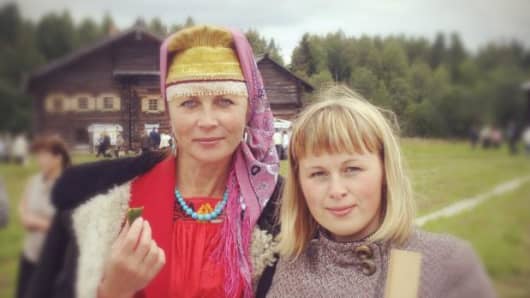If you've ever wanted to impress your clients with a hand-carved business card holder from Uzbekistan or sport a pair of Mexican guitar earrings to your next concert, a new website has the solution.
Globein.com was launched about a month ago and connects more than 100 local artisans from around the world with the online marketplace.
The company is based in San Francisco and has partners and regional managers worldwide to reach artisans from 14 countries, including Kyrgyzstan, Kenya and China.
(Read more: Walmart.com Sells Goods Made by Women-Owned Small Businesses)
"We work with people in remote areas who normally might not have access to the internet, or are prohibited by language or technology barriers from participating in the online marketplace," said GlobeIn CEO Vladimir Ermakov.
The project initially launched in December 2011, when Ermakov's partner, Anastasia Miron, hopped on a bus to Mexico and started helping local artists sell their wares online, he said. The model began expanding to other countries, and this year, they decided to invest to start an online marketplace of their own.
GlobeIn received $1.1 million in funding from entrepreneurs including AnchorFree CEO David Gorodyansky, listed as one of Forbes' most promising CEOs under 35.
From Robotics to Microlending
Ermakov is an engineer, holding a master's in robotics from Carnegie Mellon. But he became interested in the microlending movement, in which people in developing countries are lent a small amount of money to start their business. Now, the company is focused on using technology to help artisans take their budding businesses one step further.
"We see ourselves as a missing link to help them once they've started [to grow] their business," he said.
(Read more: Family Mom-Pops Resilient Amid Tough Times)
Most of the artisans on GlobeIn were discovered by traveling to regional marketplaces or through organizations that have relationships with them, Ermakov added. Profiles of each artisan are posted alongside their wares online.
For example, Vladimar Ilyushin began making leather shoes like these in Uzbekistan after suffering a leg injury in the 1990 and being unable to find the orthopedic shoes he needed. Another artist, Makha Uyutky, employs four women in Krgyzstan to make printed scarves and blankets. And a Mexican teacher, Nayeli Clara Figueroa, sews these embroidered wallets and purses in her spare time after work.
Some of the website's other unique wares include guitar-like instruments made out of catfish skins, a walnut-cracking mallet and base and black clay-fired piggy banks.
The items on GlobeIn are typically shipped within 15-30 days with nominal shipping fees. GlobeIn charges the artisans a small commission for their services.
For now, GlobeIn is focused on selling the wares in the US, since it's the largest e-commerce marketplace, but the website has gotten users from other places since its launch, Ermakov said.
"We saw that this works," Ermakov said of the project's growth since it was founded. "There are markets for these types of goods."
(Read more: 'Slow Crawl' to Prosperity as Jobs Growth 'Dives')


